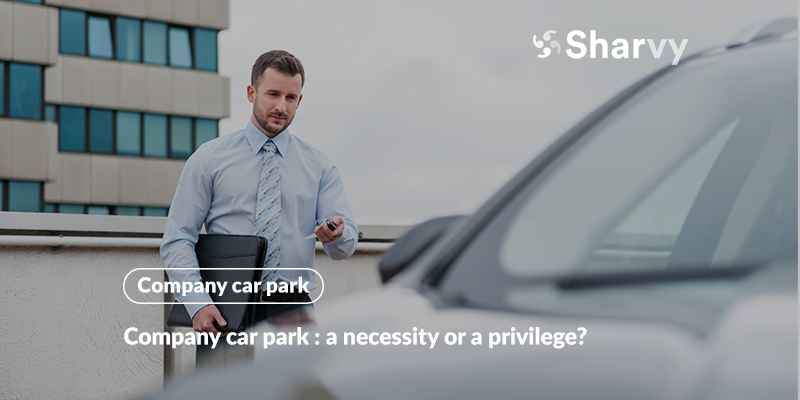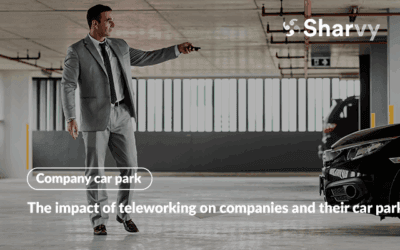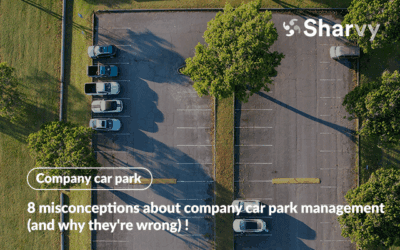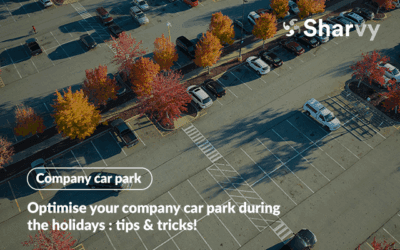As cities become more congested and urban spaces more scarce, how to allocate parking spaces within companies is becoming a key concern. As a result, a debate is emerging that is as subtle as it is pertinent: is company car parking an imperative need or a privilege to be granted?
Today, this issue within companies transcends material comfort to become a strategic challenge, combining logistical imperatives, economic considerations, and societal commitments. In this article, we explore the issues underlying this allocation of resources and the prospects for determining whether corporate car parking is an undeniable operational imperative or a real advantage.
A quick reminder : are companies obliged to offer their employees a company car park?
In the United Kingdom, companies have the flexibility to decide whether to provide parking spaces for their employees. While no national regulations mandate this, specific requirements may exist based on the company’s location, size, collective agreements, and local policies.
Indeed, some municipalities may have regulations concerning employee parking, particularly for new and renovated commercial buildings. For example, in some urban areas, local authorities may require new businesses to provide a certain number of parking spaces to meet the needs of their employees, limit congestion, and promote the use of public transport.
Collective agreements and company agreements may include provisions for employee benefits, such as parking. This can be a valuable perk that employers may choose to offer to meet regulatory requirements and attract and retain talented employees.
It’s important to note that in the UK, there is no federal or national law requiring all companies to provide parking spaces for their employees. The matter is often left to the discretion of employers and may vary according to local circumstances and each company’s internal policies. This underscores the need for employers to understand and adhere to local circumstances and company policies.
But, isn’t company car parking a necessity these days?
In many contexts, yes : company car parks appear to be an indisputable necessity, although this statement may vary depending on various factors such as the company’s location, the availability of public transport, the organizational culture, and local policies.
However, it is still a crucial element in workplace accessibility. In a world where mobility is imperative, offering employees access to parking spaces ensures they arrive at the office in the best possible conditions. Moreover, easy access promotes punctuality and enhances well-being at work by reducing the anxiety associated with the often time-consuming and stressful task of finding outside parking.
However, a common problem is emerging within companies: it is becoming (almost) impossible for them to provide a dedicated parking space for each employee.
So, faced with the reality of a supply that needs to be put in step with growing and diversified demand, many challenges arise regarding the internal organization, equity between employees, and human resources management.
So, what solutions should you adopt to ensure that as many employees as possible benefit from your company car park?
1. Establish a teleworking policy within your company.
In an era when teleworking and flexible working hours are becoming increasingly common, the absolute necessity of a company car park may be questioned. Companies are increasingly adopting teleworking policies that reduce employees’ dependency on daily travel to the workplace and, in correlation, the number of employees requiring daily access to the company car park.
This first solution reduces demand and prevents the car park from becoming saturated.
However, a new problem has arisen : the parking spaces of certain employees are (very often) reserved for them. As a result, they cannot be used by other employees. As a result, the car park is complete when it isn’t, which can lead to frustration, annoyance, and internal conflict over the long term.
But isn’t there a solution to these dissatisfactions?
Well, yes : sharing parking spaces. At first sight, this may seem obvious, but many companies think that it’s a “gas factory” to set up & and so put the management of their car parks on the back burner.
The beauty of sharing parking spaces with Sharvy is that it transforms your company’s car park into a shared resource managed collaboratively. This not only eases the burden of parking space management but also fosters a sense of equity and cooperation among your employees.
While it is common for certain employees (e.g. members of the COMEX and CODIR) to retain permanent access to the company car park, thanks to Sharvy, they can free up their spaces when they are away (teleworking or business trips).
In this way, they do not lose the use of their parking spaces daily and encourage the rotation of space use, offering equitable accessibility to all employees when their presence on-site is required.
If you’re interested in seeing the real-world benefits of Sharvy, look no further than our client, the Luxembourg subsidiary of CTG. They effectively share 80 parking spaces among 300 employees, all while implementing a teleworking policy. This success story is a testament to the effectiveness and practicality of our solution.
2. Create a fair parking policy.
If your company faces a situation where the demand for parking spaces far exceeds the supply available, consider creating an appropriate parking policy.
This can play a crucial role in solving specific problems. By implementing demand management measures, such as space reservations and incentives for the use of alternative modes of transport, you can ease the pressure on parking resources, contribute to a more palpable and productive working environment, and, above all, offer more employees access to parking.
Unfortunately, however, there are (still) many company car parks where formal guidelines have yet to be established to structure the use of parking spaces.
This situation is regularly found in companies that have, for years, had more parking spaces than employees. As a result, there is a total lack of management and access control at the entrance to the company car park. By default, access to the car park is “First Come, First Served.”
However, by defining a set of strategies to increase your parking offer’s efficiency, you will be able to transform your car park’s passive management into intelligent and active management.
Here are 3 central parking management policies to consider depending on your needs :
- Forward management : In this case, you offer your employees the possibility of reserving a parking space before they arrive on site. For example, you could provide an overview of the availability and unavailability of parking spaces so that they can plan and choose a means of transport accordingly.
- Flexible management : In the following case, you can reallocate the spaces of absent staff so that they can be reserved by other employees. This can significantly reduce the complaints and frustrations of employees with less frequent access to the car park. As a result, it’s a more flexible form of management than provisional management.
- Dynamic & fair management : in this case, you combine the above management methods. In other words, your employees anticipate their presence at the company and plan whether they will need a parking space. If an employee has a parking space and plans to be away from the office, he or she will responsibly and independently vacate the space and return it to the “common pot.” Conversely, if the employee wants a seat, they will make a request (via a dedicated application) and will obtain a seat according to a fair algorithm. Such a policy aims to enable users to consume according to their needs within a predefined framework.
3. Choose smart parking & make everyday life easier for your employees.
In addition to creating a parking policy, like a teleworking policy, consider integrating digital technologies into managing your company car park. In other words, smart parking.
Smart parking, a solution often overlooked, can be the key to unlocking the full potential of your company’s car park. This technology can significantly enhance your operations by optimizing your resources and offering more daily access to employees.
This concept aims to use digital technologies to optimize vehicle parking. For example, by installing :
- IoT sensors at each parking space (to detect the presence of a vehicle).
- Access control to the car park with automatic barrier opening.
- A number plate recognition system.
- A SaaS solution enabling users to reserve a parking space.
- A digital solution that makes it easier to allocate seats using a fair algorithm.
- Guidance to free spaces using dynamic signposting, etc.
With the integration of these digital technologies, the management possibilities are limitless. You can set rules for optimal use, establish systems for prioritizing and sharing spaces, and enforce fairness rules. This flexibility ensures the system can be customized to meet your company’s unique requirements.
For example, you can target measures that will form the pillars of your Parking Management policy and enforce them via a digital company car park management solution.
Consider incentive measures, for example, to encourage (more) rational car use by your employees. Guarantee them a space in the company car park to encourage carpooling. Also, encourage using less polluting modes of transport by making a financial contribution to your employees’ public transport season tickets. Install appropriate facilities to encourage cycling, etc.
Thanks to these digital solutions, you can devise preferential parking access measures. Employees with this access are sure to be allocated a parking space. For example, you can offer preferential access to people with reduced mobility (PRM), car-poolers, pregnant women, etc.
By integrating smart parking and digital technologies, your company can rethink how it uses its car park and ensure that as many employees as possible benefit from it.
Finally, can’t company car parks become a privilege for all employees thanks to these solutions?
The debate surrounding company car parking shows that it cannot be reduced to a simple dichotomy between necessity and privilege but lies in a subtle balance between these two aspects.
On the one hand, company parking is often seen as necessary to ensure the accessibility, safety, and functionality of the workplace. Without adequate parking spaces, your employees could find it difficult to get to the office, affecting their punctuality and productivity. Moreover, in some areas with limited public transport, company parking is essential to ensure your employees can get to work reliably and safely.
On the other hand, company parking can also be seen as a privilege, particularly in urban areas where space is limited and parking is a precious commodity. In these contexts, the allocation of parking spaces to employees can be perceived as an advantage & an additional benefit offered by the company. What’s more, with changes in working patterns & the rise of teleworking, the absolute necessity of a large number of parking spaces may be called into question, giving company parking a more optional and privileged character.
Today, however, many digital solutions like Sharvy offer this valuable advantage to more employees, helping to create a more flexible, fair, and sustainable working environment. If you’d like to learn more, contact one of our experts here.
In conclusion
The debate on parking in the workplace leads us to recognize that it cannot be approached simplistically but instead requires a nuanced approach that considers the particularities of each company, local conditions, and trends in work organization. This delicate balance between essential imperatives and optional benefits is the cornerstone of fair and efficient management of parking resources in the workplace.
By recognizing its intrinsic value and adopting a holistic and inclusive approach, businesses can leverage this often-overlooked aspect to drive productivity, engagement, and long-term sustainability.
A question? Check the following FAQ!
What are the challenges facing company car parks today?
The primary backdrop to the debate on company car parks is the space constraints & challenges inherent in urban mobility. Today’s city centers are the scene of fierce competition for available space, and the question of parking is a critical one, both for companies and for employees.
What’s more, company car parks significantly impact employee satisfaction. The availability of secure & convenient parking influences well-being at work, employee commitment, and, by extension, overall company performance. Today, however, it is (almost) impossible for companies to provide a dedicated parking space for every employee. That’s why the time has come to innovate regarding parking policy.
Especially as the economic and environmental implications associated with corporate car park management are becoming increasingly numerous, effective parking resource management can reduce a company’s operational costs and contribute to broader environmental sustainability objectives, for example, by encouraging the adoption of alternative modes of transport and reducing carbon emissions.
What are the advantages of offering a car park for both employees and the company?
There’s no doubt about it : offering all employees access to the company car park significantly benefits them and the company itself.
For employees, having access to a company car park offers convenience and peace of mind when traveling to work. They can avoid the hassle of searching for parking in often congested and stressful areas, which reduces the time spent driving around, contributing to a calmer start to the working day. In addition, it can improve the punctuality and regularity of arrivals at the office, promoting a more organized and efficient working atmosphere.
For companies, offering all employees access to the car park (thanks to a dedicated application such as Sharvy) reinforces the company’s image as an employer who cares about the well-being of its staff. This can help to boost employee satisfaction & improve their commitment to the company. In addition, fair access to parking can foster a more inclusive working environment by ensuring that all employees, regardless of their position or hierarchical level, enjoy the same parking benefits.
Providing access to company car parks can also attract and retain talent. In a competitive labor market, parking benefits can be criteria potential candidates consider when evaluating a job offer. An attractive parking policy can be an additional asset in a company’s recruitment strategy, enabling it to stand out from competitors!
Are company car parks subject to the same rules as public parking?
Want to learn more? Check out latest articles!
The impact of teleworking on companies and their car parks !
What impact does teleworking have on the organisation of companies and the use of car parks? A full analysis of the issues!
8 misconceptions about company car park management (and why they’re wrong)!
Discover 8 misconceptions about company car park management and learn the truth to optimise your parking management!
Optimise your company car park during the holidays : tips & tricks!
How can you reinvent your company car park management during the holidays? What solutions and tips can you come up with? Focus!
Subscribe to our newsletter!
Resources
Contact us
+44 117 463 6990







